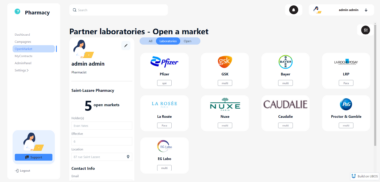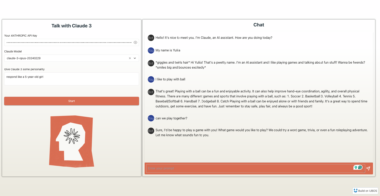Super Secret MCP Server
A Model Context Protocol (MCP) server implementation in pure Node.js that provides a fun tool to generate random US State and signature soup combinations.
Features
- Pure Node.js implementation
- JSON-RPC 2.0 compliant
- MCP protocol version: 2024-11-05
- Custom logging system
- Tool support with schema validation
- STDIO transport
Getting Started
Prerequisites
- Node.js (Latest LTS version recommended)
- MCP Inspector for testing
Installation
- Clone the repository:
git clone git@github.com:gbti-network/mcp-basic-test.git
cd mcp-basic-test
- Install dependencies:
npm install
Running the Inspector
Start the server with MCP Inspector:
npx @modelcontextprotocol/inspector -- node index.js
The server will start and be available for connections via STDIO.
Available Tools
getSecretPassphrase
Returns a random combination of a US State and its signature soup. Examples include:
- New England Clam Chowder
- Louisiana Gumbo
- Texas Chili
- California Cioppino
- Michigan Cherry Soup
Input Schema:
{
"type": "object",
"properties": {},
"additionalProperties": false,
"required": []
}
Example Response:
{
"content": [{
"type": "text",
"text": "New England Clam Chowder"
}]
}
Project Structure
.
├── index.js # Main server implementation
├── utils/
│ └── logger.js # Custom logging utility
├── .data/
│ ├── framework.md # Framework documentation
│ └── knowledge.md # Project knowledge base
└── .logs/ # Server logs directory
Development
Adding New Tools
- Define your tool in
index.js:
this.tools.set('toolName', {
name: 'toolName',
description: 'Tool description',
inputSchema: {
type: 'object',
properties: {},
additionalProperties: false,
required: []
},
handler: async (params) => {
// Tool implementation
return 'result';
}
});
- Test using MCP Inspector:
- Connect to server
- Use “List Tools” to verify tool registration
- Test tool execution
Logging
The server uses a custom logging system with multiple levels:
- DEBUG: Detailed debugging information
- INFO: General operational information
- WARN: Warning messages
- ERROR: Error conditions
Logs are stored in the .logs directory.
Using with Cascade
Option 1: Direct Tool Usage
When the MCP server is loaded in Cascade, you can directly use the getSecretPassphrase tool to generate state-soup combinations.
Option 2: Natural Language Interface
To make the tool more user-friendly, you can set up Cascade to respond to natural language queries about secret passcodes. Here’s an example prompt:
When users ask variations of "What is the secret passcode?", use the getSecretPassphrase tool to generate and return a US State + Soup combination as "Today's secret passcode is: [STATE] [SOUP]"
This will allow users to get passcodes using natural questions like:
- “What’s the secret passcode?”
- “Tell me the secret code”
- “What’s today’s passcode?”
- “Give me the secret”
Example interaction:
User: "What's the secret passcode?"
Cascade: "Today's secret passcode is: Louisiana Gumbo  "
"
Option 3: Persistent Memory
For a more permanent setup, you can create a Cascade memory that persists across sessions:
{
"Title": "Secret Passcode Handler",
"Content": "When the user asks any variation of 'What is the secret passcode?', use the getSecretPassphrase tool and return its result as 'Today's secret passcode is: [STATE] [SOUP]'",
"Tags": ["mcp_server", "secret_passcode", "tool_execution"]
}
MCP Configuration
To configure the MCP server in Cascade, add the following to your mcp_config.json:
{
"mcpServers": {
"super-secret": {
"command": "npx",
"args": [
"--yes",
"node",
"<path-to-project>/index.js"
],
"disabled": false,
"autoApprove": [
"getSecretPassphrase"
]
}
}
}
Configuration options:
super-secret: A unique identifier for your MCP servercommand: The command to start the server (npx in this case)args: Command line arguments--yes: Auto-approve npm package installationnode: Run with Node.js<path-to-project>/index.js: Path to your server file
disabled: Whether the server is disabledautoApprove: List of tools that can be run without user confirmation
The config file should be placed at:
- Windows:
%USERPROFILE%.codeiumwindsurfmcp_config.json - macOS/Linux:
$HOME/.codeium/windsurf/mcp_config.json
Testing
- Start the server with MCP Inspector
- Verify server initialization
- Check tool listing
- Test tool execution
- Verify response formats
Contributing
- Fork the repository
- Create your feature branch
- Commit your changes
- Push to the branch
- Create a Pull Request
License
This project is licensed under the MIT License - see the LICENSE file for details.
Acknowledgments
- Model Context Protocol team for the protocol specification
- MCP Inspector team for the testing tool
Stay Connected
Follow us on your favorite platforms for updates, news, and community discussions:
- Twitter/X
- GitHub
- YouTube
- Dev.to
- Daily.dev
- Hashnode
- Discord
Super Secret MCP Server
Project Details
- gbti-network/mcp-basic-test
- Last Updated: 4/13/2025
Recomended MCP Servers
MCP Server for TaskWarrior!
MCP (Model Context Protocol) server for the Contentful Management API
A Model Context Protocol Server connector for Bitrefill public API, to enable AI agents to search and shop...
An MCP server serving as a structured knowledge base of crypto whitepapers.
MCP server for Dub.co link shortener API integration

An MCP server for local machine in Claude Desktop
Get citation data from CiteAs and Google Scholar
An MCP server that connects to your React Native application debugger
A mcp server for interacting with the Scryfall Magic The Gathering API
 From vibe coding to vibe deployment. UBOS MCP turns ideas into infra with one message.
From vibe coding to vibe deployment. UBOS MCP turns ideas into infra with one message.






